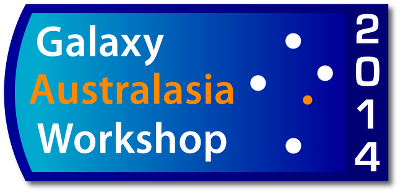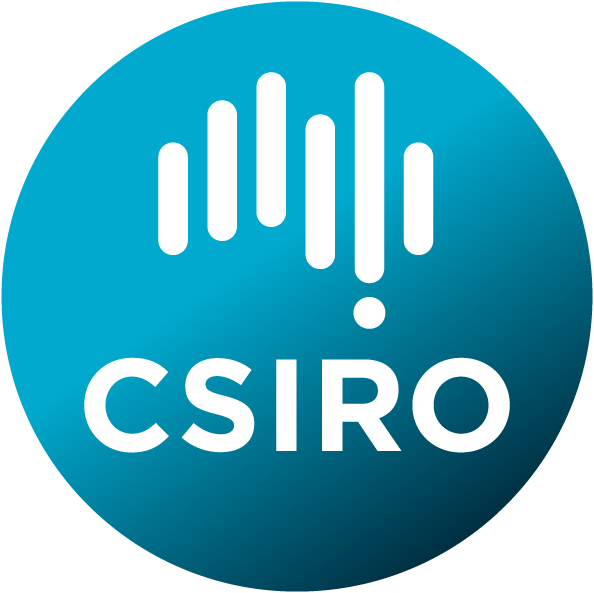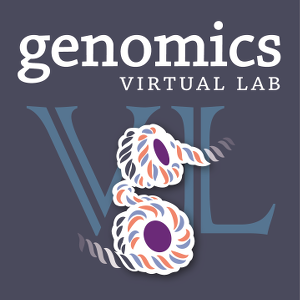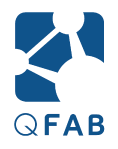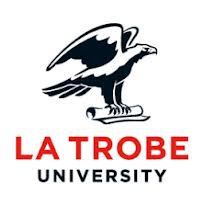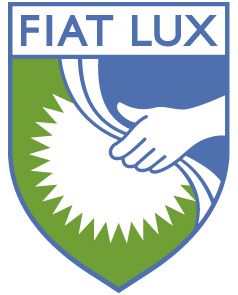Galaxy Australasia Workshop 2014 (GAW 2014)
The 1st Galaxy Australasia Workshop 2014 (GAW 2014) was held in Melbourne, Australia on 24 and 25th March 2014.
The Galaxy Australasia Workshop was a great opportunity to participate in two full days of presentations, discussions, poster sessions, keynotes and lightning talks, all about ways of using Galaxy for high-throughput biology, imaging and other scientific applications. The workshop will also include Training Sessions taught by Galaxy developers and master users. GAW 2014 ran 24 and 25th March, immediately preceding Computational and Simulation Sciences and eResearch in Melbourne.
GAW 2014 also included poster session and keynote speakers.
**You should attend to: **
- Present your work!
- Learn best practices for deploying Galaxy, defining and installing resources, and managing and moving large datasets.
- Network with others in the Galaxy community who are facing similar challenges and using Galaxy and other tools to address them.
- Learn what the Galaxy Project's plans are, and contribute to Galaxy's future direction.
-
Learn
- how to visualize your data in Galaxy and use visualization to guide your analysis (visual analytics)
- how to share, publish, and reuse your analyses with Galaxy
- how to perform and enable your users to perform common, yet complex, analyses using Galaxy
- when and how to use Galaxy on the Cloud
Program
Day 1, 24th March 2014
| Time | Title |
|---|---|
| 10:00-10:10 | Welcome. Logistics, etc. Organising Committee |
| 10:10-10:35 | Keynote: Reproducible complex analyses as a scientific commodity: Why Galaxy matters Ross Lazarus (download pdf slides) |
| 10:35-11:00 | Morning Tea |
| 11:00-11:30 | Launching your (small) Galaxy instance on the Research Cloud Andrew Lonie Live Demo - no slides. Follow the Launch GVL Basic Guide |
| 11:30-13:00 | Galaxy 101 - a tutorial Mark Crowe (download pdf slides) |
| 13:00-13:50 | Lunch Break During lunch, assistance will be available to help attendees set up a Galaxy on GVL |
| 13:50-14:05 | Tips and tricks open mic Chair: Ira Cooke |
| 14:05-14:40 | Galaxy in the wild: Galaxy Architecture and Supporting Production Level Genomics Nate Coraor (download PDF slides) |
| 14:40-15:20 | Introduction to the Tool Shed: Tight dependency control for reproducible analysis Ross Lazarus (download pdf slides) |
| 15:20-15:50 | Afternoon Tea |
| 15:50-16:20 | CloudMan Project Enis Afgan (download pdf slides) |
| 16:20-17:00 | Setting up and administering Galaxy - panel discussion Stephen McMahon, Nate Coraor, Enis Afgan |
Posters
Posters to be displayed throughout the day:
| Poster |
|---|
| [Microbial Community Analysis of Indonesia Tempeh Employing Metagenome Galaxy](https://f1000research.com/posters/7-1411) Adi Yulandi, Faculty of Biotechnology Atma Jaya Catholic University of Indonesia (download pdf poster) |
| Training with the GVL Simon Gladman, VLSCI - LSCC (download pdf poster) |
| Cloud-based Image Analysis and Processing Toolbox Tomasz Bednarz, CSIRO (download pdf poster) |
Day 2, 25th March 2014
| Time | Title |
|---|---|
| 09:00-09:10 | Welcome. Logistics, etc. Organising Committee |
| 09:10-09:50 | Keynote: Galaxy - past, present and future Nate Coraor (download PDF slides) |
| 9:50-10:30 | Bioinformatics Stream |
| 9:50 | Using Galaxy for Proteogenomics Ira Cooke (download PDF slides) |
| 10:10 | shRNA-seq analysis in Galaxy Matthew Ritchie (download PDF slides) |
| 10:30-11:00 | Morning Tea |
| 11:00-12:30 | General Stream |
| 11:00 | The Australian Genomics Virtual Lab Andrew Lonie (download pdf slides) |
| 11:30 | Building a Galaxy user community for a fully supported Galaxy service Annette McGrath (download PDF slides) |
| 11:50 | Galaxy with GenomeSpace Yousef Kowsar |
| 12:10 | Using Galaxy cloud servers for command-line analyses Clare Sloggett (download PDF slides) |
| 12:30-13:30 | Lunch Break |
| 13:30-14:50 | Application Stream |
| 13:30 | Cellular Imaging tools on NeCTAR cloud Yulia Arzhaeva (download pdf slides) |
| 13:50 | Secure Cloud Data Storage for Galaxy Workflows Carsten Friedrich (download pdf slides) |
| 14:10 | CSIRO in house tools and dealing with Big data Philippe Moncuquet (download pdf slides) |
| 14:30 | Galaxy service at CSIRO Stephen McMahon (download pdf slides) |
| 14:50-15:30 | Afternoon Tea |
| 15:30-16:10 | Genomics VL Stream |
| 15:30 | Building, Launching and Maintaining Galaxy on the Australian Research Cloud Ron Horst (download pdf slides) |
| 15:50 | Scaling the GVL: Empirical Evaluation of Galaxy Scalability Characteristics Nuwan Goonasekera (download pdf slides) |
| 16:10-17:00 | Panel |
Venue(s)
GAW 2014 was held in Melbourne, Australia on 24 and 25th March 2014.
The first day (Monday) was at Monash University, MBI Auditorium (Building 220), 770 Blackburn Rd, Clayton (map); next to the Australian Synchrotron.
For the 2nd day (Tuesday) we moved downtown to the Melbourne Convention Centre, the venue for the Computational and Simulation Sciences and eResearch.
Travel Info
Airport to/from City
myki public transport
It may be worth buying a myki card; then you will have no issues using train/bus to Clayton and trams around the city. $6 for the card, plus $12.12 bus/train return to Clayton campus, plus trams around the city.
Monday: Clayton MBI Auditorium, 770 Blackburn Rd
The Australian Synchrotron is about 15 minutes walk from the Monash University Clayton Campus Bus Loop. Travelling to Clayton Campus and Public Transport to Clayton Campus - Detail
Tuesday: Melbourne Convention Centre
Consider Melbourne City Bikes, though the closest Bike Share Station is across the river.
Promotion
Help get the word out about GAW 2014.
 |
Please print, post and distribute the conference flier at your organization, and or events. |
The conference logo is available in 200 pixel, 400 pixel, and 600 pixel resolutions for inclusion on web sites, presentations, and posters.
Twitter Hashtag
Please use #gaw2014 as the Twitter hashtag for the meeting.
Conference Report
The first Galaxy Australasia Workshop was held on Monday 24th and Tuesday 25th March. Conference venues and catering were provided by CSIRO (Australia's national science agency) so attendance was free.
Day 1 was held at the Monash Biomedical Imaging Auditorium at Monash University. The large auditorium did make the audience seem small, and perhaps the distance of the venue from the Melbourne CBD discouraged those few who had registered but did not attend.
Ross Lazarus (Baker IDI/Galaxy) opened in his usual entertaining manner and told us Why Galaxy matters: Reproducible complex analyses as a scientific commodity.
Andrew Lonie (VLSCI/GVL), despite the usual risks of doing anything live, successfully demonstrated how to Launch a bioinformatics analysis server installed with Galaxy on the Australian Research Cloud and a handful of attendees followed along and launched their own GVL Galaxy server.
Mark Crowe (QFAB/GVL) presented a tutorial on using Galaxy, aimed at the members of the audience new to Galaxy.
The tips and tricks open mic session went well, with even some experienced Galaxy users learning a few things they hadn’t known.
The rest of the afternoon consisted of some more presentations and then a panel discussion about Setting up and Administering Galaxy, which again worked quite well given our small audience size. This reflects on the level of engagement of all those present.
The day closed amidst the usual scrum of organising taxis and public transport to return to accommodation and the evening’s ad hoc social events.
Three posters were displayed, including "Microbial Community Analysis of Indonesia Tempeh Employing Metagenome Galaxy" which was brought to us by some enthusiasts all the way from Indonesia.
Day 2 was held in the Melbourne Convention Centre, alongside CSIRO’s Computational and Simulation Sciences and eResearch conference.
Nate Coraor, our special guest from the Galaxy Project, entertained us with a look at working versions of Galaxy from the past, and updated us on Galaxy in the present and coming in the future.
Then two presentations about using Galaxy for Bioinformatics Analysis: Using Galaxy for Proteogenomics from Ira Cooke (Latrobe) and shRNA-seq analysis in Galaxy from Matthew Ritchie (WEHI).
The GVL Project and CSIRO each gave us a few presentations about their progress with Galaxy, including CSIRO’s Philippe Moncuquet explaining how CSIRO is managing the large volumes of data.
Further interesting talks included Yousef Kowsar (VLSCI/GVL) showing us progress with an Australian Research Cloud version of GenomeSpace integration with Galaxy, Clare Sloggett (VLSCI/GVL) demonstrating some utilities that enhance the GVL command line servers, Yulia Arzhaeva (CSIRO) showing a Galaxy implementation of Cellular Imaging tools rather than Bioinformatics Tools and Carsten Friedrich (CSIRO) showing a Galaxy Tool interface to Secure Cloud Data Storage.
David Lovell (CSIRO), as representative of the Australian Bioinformatics Network, closed the conference by working with us to develop a worthwhile mind map (pdf) of actions we would take as a result of attending the Conference.
Slide presentations appear on the GAW2014 conference programme.
